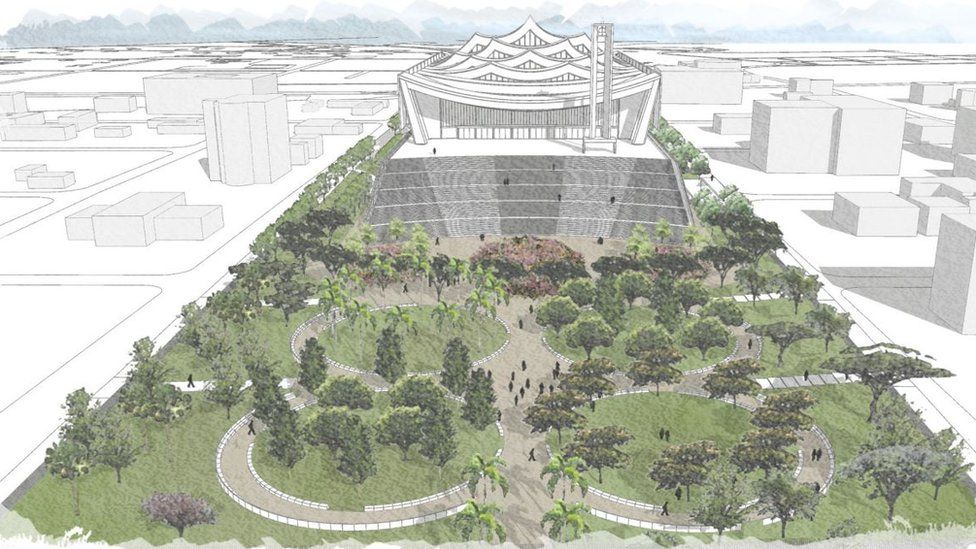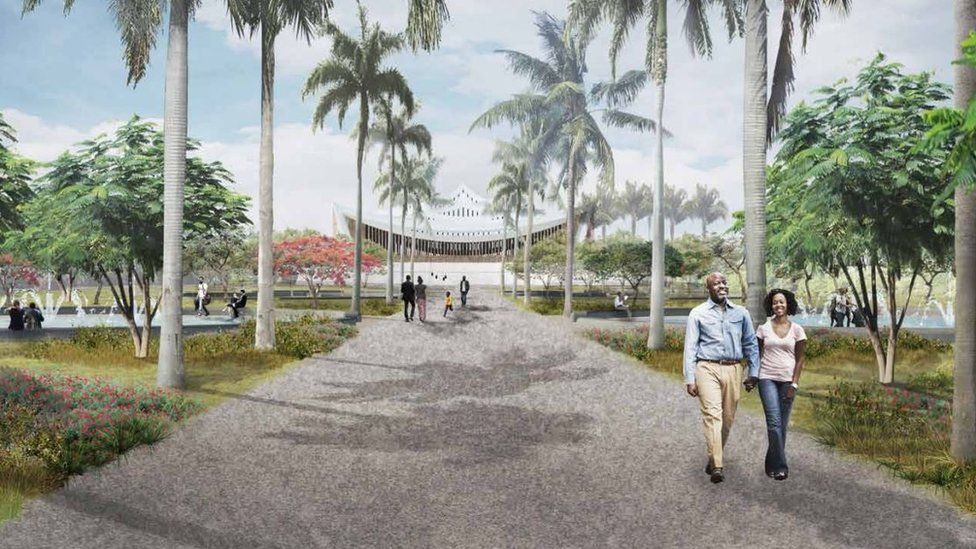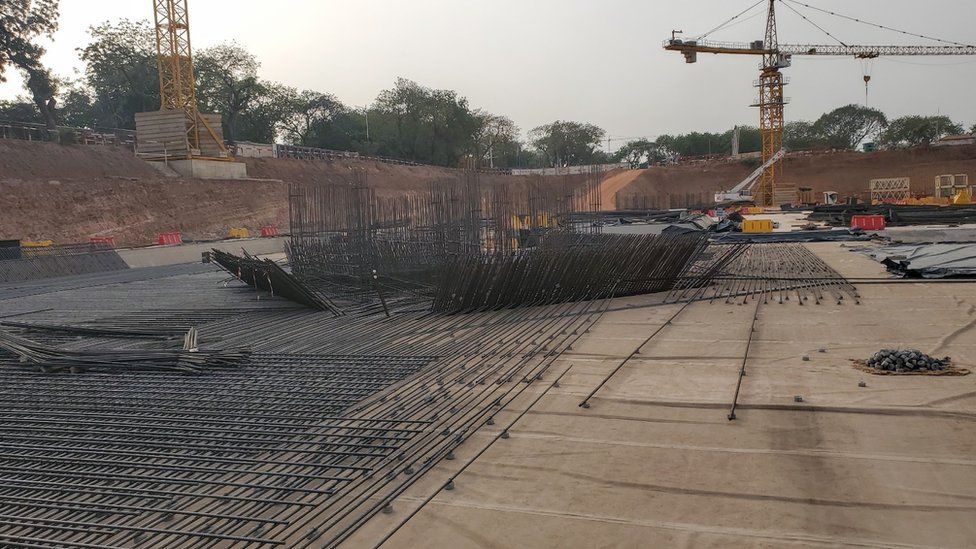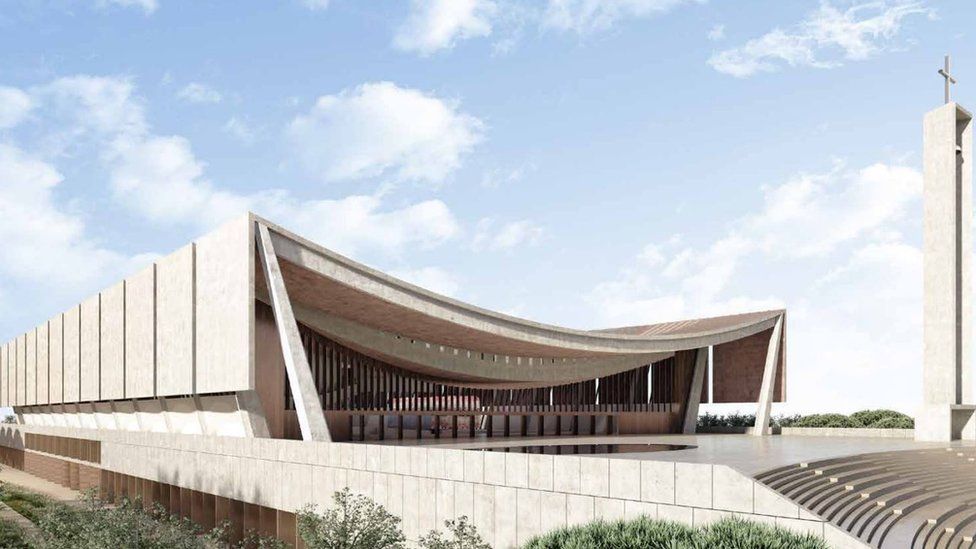Hoardings covered in artistic renderings of an architectural marvel in Accra, the capital of Ghana, prevent curious eyes from seeing what is on the other side.
Depending on who you ask, the multimillion dollar structure, also known as the National Cathedral of Ghana, is either a metaphor for the nation's poor economic management or a wise and audacious investment.
President Nana Akufo-Addo reiterated his commitment to the religious structure in a speech at the beginning of the year, just two weeks after Ghana effectively defaulted on repaying most of its external debt due to an intensifying cost of living and economic crisis. He did this while mocking his detractors.
At the building site where a Bible reading marathon was taking place, the president said, "The National Cathedral is an act of thanksgiving to the Almighty for his blessings, favour, grace, and mercies on our nation.".
He claimed that God had spared Ghana from war, which had befallen many nations, including some of its West African neighbors, who were struggling with numerous security issues.
After that, the president disclosed a personal contribution to the building fund of 100,000 cedis ($8,000; £6,700). It was intended to be a place of worship for all Christians, who account for 70% of the population, where all national religious services could be held.
However, the public is split over Mr. Akufo-Addo's enthusiasm for the initiative.

Critics have questioned how much money the government has already spent ($58 million) in these hard economic times, despite the fact that most of the costs are supposed to be covered by donations and the state providing the land and some seed funding.
In addition, there have been allegations of financial misappropriation and controversy surrounding the selection of renowned British-Ghanaian architect Sir David Adjaye for the project's design, which has strained relations with some of the most influential Christian figures who serve on the National Cathedral board of trustees.
The board has approved a financial audit and agreed to allow the parliament to look into how contracts were awarded, and the authorities reject these allegations.
Theo Acheampong, an economist in Ghana, thinks the government's priorities are wrong given the country's current economic circumstances, which include a depreciating currency, shrinking foreign reserves, and stressed public finances.
"A generational crisis exists. The government must reduce spending because of the country's high level of inflation and inability to pay off its debt. The cathedral is also not a national priority at a time when the government is applying for a $3 billion loan from the International Monetary Fund, according to Mr. Acheampong.
After he won the 2016 election and hired the architect two years later, Mr. Akufo-Addo first revealed the cathedral's plans. However, the president has said that he is working on "his gratitude to God," and that work didn't start until 2022, two years after his reelection.
But since MPs refused in December to approve a further budget allocation from the government of $6.3m, the sound of heavy machinery chiseling the earth and animated workers shouting over the din at the construction site has vanished.
Sam George, a prominent opponent of the project who participated in a debate in parliament last month, attacked the government by quoting from the Gospel of Luke.
"Imagine that one of you wants to construct a tower. His opposition colleagues, suitably amused, applauded when he finished reading the verses. "Won't you first sit down and estimate the cost to see if you have enough money to complete it? For if you lay the foundation and are not able to finish it, everyone who sees it will ridicule you, saying: "This person began to build and wasn't able to finish.".

It is impossible to criticize the project's vision.
Between the parliament building, the national theater, and the international conference center, a nine-acre site of prime land was set aside for the National Cathedral.
Residential homes for judges had previously been there; the decision to demolish them caused its own uproar.
The cathedral will have a high pitched staggered roof imitating the style of the Akan people, drawing inspiration from Ghana's vibrant arts and culture. Additionally, ceremonial canopies and Ashanti royal stools will be included as symbols.
The religious decorations and furnishings for the cathedral will be made by artists from Ghana and other African nations.
A national crypt for state burials, a music school, an art gallery, shops, and Africa's first Bible museum will all be located in the main building, which will have 5,000 permanent seats and space for thousands more.
But its critics are unimpressed by the grandeur.
According to the MP Mr. George, "taxpayers' money should not be used to fund a personal pledge to God.".
He called the cathedral a "vanity project," evoking Félix Houphouet-Boigny, the architect of the world's largest church, The Basilica of Our Lady of Peace of Yamoussoukro, which was constructed by the Ivory Coast's independence leader to transform his hometown.
Even though we are Christians, Mr. George asserted, "the government has no business funding the construction of a religious building.".
Paul Opoku-Mensah, the presidential appointee in charge of the National Cathedral project, maintains his confidence in its viability and believes it will help the economy despite the opposition.
"Unlike Ivory Coast, we have a plan for attracting tourists to Ghana. Our religiousness must be put to use for our own growth, he said.
Mr. Mensah has been to the Bible Museum in Washington, DC, and is arranging for loans of sacred objects from Israel to be displayed at the cathedral once it is finished.

It has been argued by detractors that the project's cost has fluctuated over time, including a claim that it could reach $1 billion.
The building would only cost $350 million, Mr. Mensah told the BBC. He said, "That number is sacred," adding that the cathedral would serve as a center for Christians, drawing people from across the continent and beyond and generating revenue for the building.
In addition, he refuted claims that the cathedral was the Christian majority's response to the $10 million Ghana National Mosque, which was erected with funding from the Turkish government. It was introduced in 2012.
Although Ghana's economic crisis cannot be ignored, Mr. Mensah claimed that the project had become "caught up in the divisive politics of our country." He added that while critics did not understand the viability of the cathedral, which early estimates claim could generate $95m in five years, they had failed to consider Ghana's economic crisis.
"We're looking at what great cathedrals did to Europe by pushing the boundaries of music, art, and engineering, but given the economic conditions we face, we can review our plan," the architect said. "For example, we could do phased construction and reconsider what kind of artefacts we install in the building.".

Mr. Mensah said his team was looking at alternative ways to raise the money after parliament rejected funding for the cathedral.
"We are creating strategies to mobilize large amounts of money, like persuading a million Christians to give $20 per month for two years. Additionally, we want to entice contributions from private businesses, donors, and members of the diaspora. " .
However, Mr. Mensah is still working on getting the project's funding from the MPs. He wants to set up a meeting with them because he thinks some of them don't fully understand the project.
However, he also acknowledges that there are risks to the project and that it is unlikely to be finished before President Akufo-Addo leaves office in 2019.
"The completion depends on our ability to secure the required funding. Our current attention is on that, according to Mr. Mensah.







